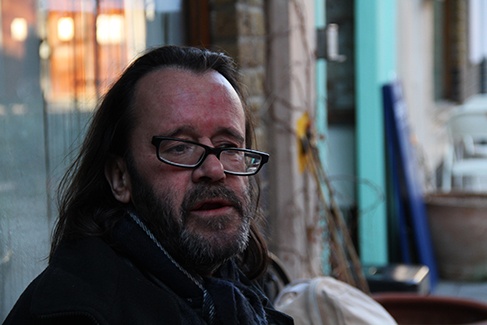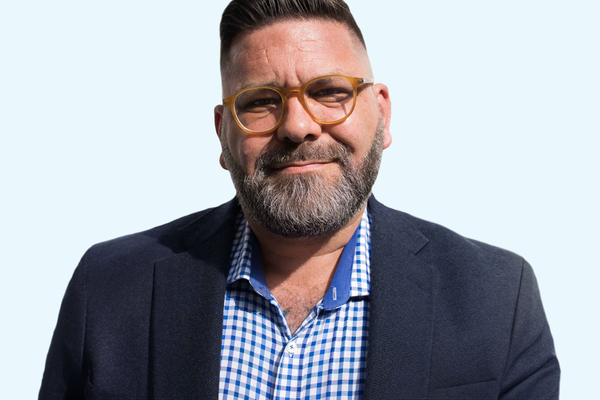Homeless for 13 years: Grant's story
The homelessness debate can often be caught up in facts and figures. As the Homelessness Reduction Bill makes its way through parliament, Danielle Aumord talks to one man about life in the system
Video:
new features style

Grant Kingsnorth, 53, has been homeless for 13 years. He has lived in several hostels and is now in supported accommodation run by Family Mosaic in Hackney. Grant hopes to move to a permanent social housing unit soon.
Video:
Ad slot
How did you end up becoming homeless and living in supported housing?
I was living in a housing association flat but my housing benefit claim got messed up by the council. Subsequently, I was taken to court six times by my housing provider and issued with a notice to quit.

I then lived in a squat for six months for which I paid £20 a week, and I spent 10 weeks in hospital because of a vicious attack. I was then housed in temporary accommodation for three months.
There, I’d find crack pipes in the shared bathroom and the place was constantly being raided by the police. The staff were just there to check that all the residents were alive and that none of us were sub-letting our rooms to prostitutes.
I then spent seven years in a kind of private hostel. It seemed to be a warehousing scheme. I never heard of anyone getting moved on from this place into permanent accommodation.
After I left, I found out that I’d been lining up for breakfast every morning with a guy with a 30-year history of sexual offences. Despite all of this, I count my blessings because I’ve only slept rough six times in my life.
“In all the hostels I’ve lived in, drug dealing has been prolific and a danger to the residents.”
Grant Kingsnorth
Because I’m in recovery from alcoholism, I was found to be suitable for a St. Mungo’s hostel. I spent two and a half years there but I was stupid and unfortunately got nicked. As a result, in 2013 I spent three weeks in prison over Christmas; when I got out, I shacked up at the Hackney Winter Night Shelter scheme.
They looked after me incredibly well but it was tiring because you stayed at a different church each night of the week. The staff there got me an interview with Family Mosaic in March 2014 and I moved into my supported self-contained one-bedroom flat the same evening.
It was a hugh relief. The deal is that they help me with my addiction and move me on at some point to social housing. I have told them that I don’t want private accommodation because I’m working my way towards full-time work. I want to be able to afford my rent when I’m not on benefits.
What examples of good practice did you experience in supported housing and hostels?
I found the holistic approach to recovery from homelessness and addiction at St. Mungo’s very helpful. They were well plugged into community-based mental health services for referrals and I was encouraged to pursue education.
They are also the only supported housing organisation that I know of that will allow tenants to have pets. I know people who are choosing to stay street homeless because their housing provider doesn’t allow animals.

Pets are therapeutic. All I want in life is a little dog, a little job and a little council flat.
Another example of good practice is that my Family Mosaic key worker helps me to monitor my drinking. He knows that my last employment went belly-up so he’s also helping me with my job search plans.
What about bad practice in the places you stayed?
In all the hostels I’ve lived in, drug dealing has been prolific and a danger to the residents.
The staff need to be aware that these things are going on. It should be made clear that dealing in illegal substances is unacceptable and clients discovered doing this should be given a written warning and adjust their behaviors.
“I know people who are choosing to stay street homeless because their housing provider doesn’t allow animals.”
Grant Kingsnorth
In one of my hostels, the managers would regularly talk about people’s business in public spaces. It could be concerning the police, social workers or your housing benefit claim. In my previous life, I worked in social care and I know that confidentiality is integral to good practice.
Are there things that supported housing providers do that are counterproductive?
I often find clients with mixed needs housed together. For example, people with offending issues are placed in hostels with clients with mental health needs.
It can be damaging because vulnerable people can be taken advantage of. A woman I used to live with was scared of other residents taking money off her so I used to walk her to the Post Office to cash her giro cheque and back again to our hostel. I was threatened as a result.
What do you think should be done to help homeless people such as yourself?
We should combat the ‘one size fits all’ approach to clients often used by staff. Clients should be able to look at their care plans with their key workers, to review their set aims and objectives.
There should also be ‘move on’ support for a minimum of nine months for clients when they leave, because moving into independent housing is clearly not going to be straightforward. Monthly check-ins to monitor your progress would be helpful.
What should supported housing organisations do to improve?
Some of these organisations are bidding for public contracts worth millions of pounds to look after vulnerable clients, so I’d like to see more transparency and accountability. They should take on the views of clients to develop best practice policies within in-house service user forums at hostels.
If they are listening to clients, they’d be able move clients into permanent accommodation at a much faster rate.
The minutes taken at these meetings should also be publicly available for all to scrutinise.









